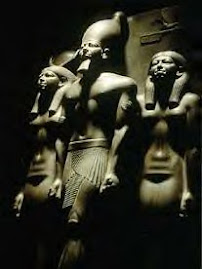Talking doesn't fill the basket in the farm.(Success requires planning and hard work.) African Proverb
Abraham Lincoln a Racist?
In his new book, Forced Into Glory: Abraham Lincoln's White Dream, black American author, Lerone Bennett, presents historic evidence supporting the theory that Abraham Lincoln was, in fact, a devoted racist harboring a life-long desire to see all black Americans deported to Africa.
Bennett suggests that as a young politician in Illinois, Lincoln regularly used racial slurs in speeches, told racial jokes to his black servants, and vocally opposed any new laws that would have bettered the lives of black Americans.
Key to Bennett's thesis is the 1863 Emancipation Proclamation which, Bennett argues, Lincoln was forced into issuing by the powerful abolitionist wing of his own party. Bennett asserts that Lincoln carefully worded the document to apply only to the rebel Southern states, which were not under Union control at the time, thus resulting in an Emancipation Proclamation that did not in itself free a single slave.
At one point, Bennett quotes William Henry Seward, Lincoln's secretary of state, who referred to the proclamation as a hollow, meaningless document showing no more than, "our sympathy with the slaves by emancipating the slaves where we cannot reach them and holding them in bondage where we can set them free."
Henry Clay Whitney, a close friend of Lincoln, is quoted by Bennett as saying the proclamation was "not the end designed by him (Lincoln), but only the means to the end, the end being the deportation of the slaves and the payment for them to their masters - at least to those who were loyal."
Bennett asserts that Lincoln often put forth plans for deporting the slaves to Africa both before and during his presidency.
The tone of Forced Into Glory: Abraham Lincoln's White Dream is decidedly angry, as if Bennett feels betrayed by what he calls the "myth" of Abraham Lincoln.
"No other American story is so enduring. No other American story is so comforting. No other American story is so false." -- Lerone Bennett, Forced Into Glory: Abraham Lincoln's White Dream.
Is What Bennett Alleges True?
Had he not been assassinated just 10 days after the end of the Civil War, would Lincoln have tried to carry out the black exportation plans purported by Bennett? Was Abraham Lincoln actually a racist?
Remember that Lincoln entered the political arena in the late 1850s when a view of slavery as an assault on human rights was still a brand new and not widely held concept. For most of their youths, Lincoln and his contemporaries would have encountered the slave as nothing more than the "somebody" who did the "dirty" jobs of those days.
Many Lincoln researchers do acknowledge what would, today, be considered "racist" overtones in Lincoln's early political life. On Oct. 13, 1858, during his famed debates with Judge Stephen A. Douglas, Lincoln spoke to what he considered to be basic black and white racial differences "which, in my [Lincoln's] judgment, will probably forever forbid their [blacks] living together on the footing of perfect equality."
In the same speech, Lincoln states, "I agree with Judge Douglas that he [a black] is not my equal in many respects, certainly not in color ? perhaps not in intellectual and moral endowments; but in the right to eat the bread without leave of anybody else which his own hand earns, he is my equal and the equal of Judge Douglas, and the equal of every other man." In this statement, despite his reference to differences in "intellectual and moral endowments," Lincoln shows his belief that both black and white were entitled to equal rights and protection under the Constitution. (Source: The Founder's Library - Lincoln-Douglas Debates)
As President, Lincoln's struggle to end the Civil War and preserve the nation left him deeply sympathetic to the plight of the slaves and increased his belief in the need for racial equality in America.
After seeing over 200,000 African-Americans volunteer and fight alongside Union forces, Lincoln dropped his support for plans to colonize freed slaves to Africa after the Civil War. In an 1863 speech, Lincoln stated, "there will be some black men who can remember that, with silent tongue, and clenched teeth, and steady eye, and well-poised bayonet, they have helped mankind on to this great consummation, while, I fear, there will be some white ones, unable to forget that, with malignant heart, and deceitful speech, they have strove to hinder it."
On April 11, 1865 Lincoln delivered an address in which he became the first president to advocate extending voting rights to African-Americans who fought for the Union when he stated, "It is also unsatisfactory to some that the elective franchise is not given to the colored man. I would myself prefer that it were now conferred on the very intelligent, and on those who serve our cause as soldiers." By this statement, Lincoln indicated his belief that African-Americans should have full political equality. In the crowd that day, an intently listening fellow named John Wilkes Booth commented to those around him, "That is the last speech he will ever make." And so it was. (Information Source: The Lincoln Museum Web Site)
To apply 20th century beliefs and standards to an America of 1858 and declare Abraham Lincoln a "racist" is a faulty formula that unfairly distorts Lincoln's true role in advancing civil and human rights. By the standards of his time, Lincoln's views on race and equality were progressive and truly changed minds, policy and most importantly, hearts for years to come.












No comments:
Post a Comment